________________
156
INDIAN LOGIC
different from object to object, that there is one eternal white colour. that appears to be different from shade to shade.62 The only pity is that Jayanta's own doctrine of a ‘universal' which he so emphatically shares with the Mimāṁsaka is an ominous step in the same dangerous direction. Little wonder, Jayanta clashes with the Mīmāṁsaka on the question of a ‘universal' itself. Thus he tells the latter : 'On your logic one can as well say that there exists one eternal cow, while two particular cows appear to be different because two different manifesting agents make manifest this one eternal cow.''63 The Mīmāmsaka pleads : “But there is nothing to make manifest the two particular cows which are rather what make manifest the universal 'cowness'??.64 Jayanta retorts : "You cannot be allowed to say that; because you do not allow us to say that two pronunciations of a letter make manifest the universal concerned. As for a particular cow, it can be cognised through an eye-operation etc."65 The Mimāṁsaka pleads : “But a particular cow appears to be different from another as soon as an eye is just directed that way;">66 Jayanta retorts : "No. What first appears to be there is a cow as such while.a particular cow appears to be there after an eye-operation etc. has taken place. Moreover, if you allow that a particular cow as diferent from another is cognised first of all why not allow that a letter-pronunciation as different from another is cognised first of all."67 As can be seen, Jayanta and the Mīmāmsaka are absolutely agreed so far as their acceptance of the ‘universal’-doctrine is concerned, but they. differ as regards their understanding of the phenomenon of letter-pronunciation. Thus basing himself on the consideration that two pronunciations of the same letter are not so strikingly different from each other as are two particular cows the Mīmāṁsaka comes out with the suggestion that what is common to two pronunciations of the same letter is the particular letter itself and not the ‘universal' concerned; according to Jayanta, on the other hand, what is common to two pronunciations of the same letter is the 'universal' concerned just as what is common to two particular cows is the universal 'cowness'. Hence it is that Jayanta concludes the present phase of his enquiry by thus admonishing the Mīmāṁsaka : “So this is the sum and substance of the matter. Either ignore altogether how universal-particular relationship is grasped or say that there is a universal 'g-ness' common to all 'g's just as there is a




